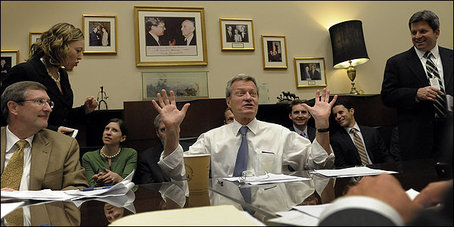
US Senators Conrad (D-ND) and Baucus (D-MT) are shown here seated. (Melina Mara -- The Washington Post Photo)
Ezra Klein recounts Finance Committee members Senator Kent Conrad (D-ND) and Max Baucus (D-MO) tale of how they “Came up” with the co-op plan as a political solution.
In early June, Max Baucus asked Kent Conrad to solve this argument. Conrad came up with the co-op proposal. And I literally mean “came up” with it. Conrad told me that the idea emerged “out of conversations in my office after we were asked to see if we couldn’t come up with some way of bridging this chasm.” To put it bluntly, the co-op does not solve a policy problem so much as it solves a political problem. That political problem was, “How do you finesse a compromise on the public option?”
via Ezra Klein – Co-Ops as an Alternative to the Public Plan .
A June 18, 1993 an article in the Toledo blade entitled: Health Care co-op concept at heart of Clinton reform contradicts Baucus and Conrad’s accounts of their own ingenuity. A as part of a 1993 letter to the Editor of the New York Times, Published October 15, 1993, in response to a William Safire editorial, Senator Jay Rockefeller (D-WV) clearly mentions health care co-ops:
A health care co-op — an alliance under the Clinton plan — will do what co-ops traditionally do: empower consumers as part of a larger buying pool. Competition will be the order of the day as insurance companies compete to sell their services to alliances, the only place they can go to do business.
Conrad’s staff just dug up Bill and Hillary’s old homework from the early 1990’s. All the plans being bandied about as new alternatives existed 15 years ago, to the day. Republicans didn’t vote for this then and they won’t today. Baucus has worked with Grassley since 1981 on the Senate Finance Committee. Most observers would believe he had a good idea of where Grassley stood on these issues prior to building his committee. Since no progress has been made in Senate Finance Committee on health care for the last 16 years, what real work are Red State, Blue Dog democrats Baucus and Conrad (representing the 44th and 48th most populous states, respectively) really accomplishing in these closed door deliberations? What does this say about Baucus?
Maybe:
- Baucus is completely incompetent. He chose to subject health care reform under a 60/40 democratic/republican majority congress to the whims of a 50/50 Democratic/Republican ad-hoc committee with the GOP half positioned firmly to the right of Republican party in 1993 and the majority in the 2008 election. Baucus originally built a committee with 4 GOP senators and 3 Dem senators, but Orrin Hatch stepped aside.
- Baucus isn’t pro-reform. Montana and North Dakota voted for McCain/Palin and as the insurance and pharmaceutical industry donations fill up Blue Dog campaign coffers, it seems they are stalling so that they can purposefully strangle health care reform.
The Baucus is an incompetent angle just seems unlikely. Volumes of bills have been trimmed, bolstered and then ushered into signed legislation during Baucus’ consecutive terms since 1975 he has worked under Finance chairs such as Patrick Moynihan (D-NY) and Bob Dole (D-NC). In reality, the why at this point is irrelevant. While Pelosi and Clyburn got the house to produce bills with the President’s preferred compromise single payer public insurance options, insurance exchanges, and public health subsidies Senate Majority Leader Harry Reid has been missing in action while his Finance Committee chair has bucked the President, Senator Rockefeller, the chair of the Finance sub-committee on Health Care, millions of general election voters and himself in 2008. Yes, himself: A public option was essential to Baucus’ proposal, published November 12, 1998 which can be viewed here (c/o Jed Lewison at DailyKos).
The President convinced his supporters that a public or private health insurer, single payer option available on an open market exchange was the heart of the most sensible, necessary, health care reform policy. The GOP is energized by opposing a Democratic president who they personally dislike and/or distrust for visceral reasons. This visceral dislike is given thin cover by GOP elected officials and Washington, D.C. insiders who formerly held office that toss out unfounded accusations of socialism, ‘death-panels’, fascism, and racism. Baucus is giving them cover by “negotiating” with them. In reality, Baucus seems to be allowing the GOP to give it their best try to soften any health care reform plan that comes into his committee so that by the time he produces draft legislation, his esteem with his right leaning home state constituency and his campaign/PAC check book balances won’t be affected.
Obama needs a healthy something reform bill passed or he has failed to deliver on one of his main campaign promises. As of now, he needs to privately explain exactly what courses of action are acceptable to Baucus and other Blue Dogs in the senate. Sitting in a room with the Mount Rushmore of health care opponents is not one of them. If Baucus won’t budge, and both houses of congress grind to a hault, then Howard Dean may have the best advice: strip the bill of all budget/funded measures and make it a regulation overhaul. Second, Obama needs to continue to make his case in the plainest of English to the American voter and to invite skeptics to challenge his ideas and logically dismantle opposition talking points which have been steadily peddled as principled objection. He started on Micheal Smerconish’s Syndicated Radio show .
Congressional Democrats need to re-evaluate the system where they allow a legislator elected by a constituency that is generally opposed to the party platform to control their legislative agenda. The chair of the Senate Finance Committee is the most powerful post in the Senate and there is simply too much friction between Max Baucus’ political reality and the party platform for him to be truly beneficial to Obama’s progressive agenda laid out in the 2008 primaries and campaign.

